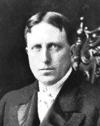- Hearst, William Randolph
-
died Aug. 14, 1951, Beverly Hills, Calif.U.S. newspaper publisher.Hearst in 1887 took over the struggling San Francisco Examiner, which he remade into a successful blend of investigative reporting and lurid sensationalism. After buying the New York Morning Journal (later New York Journal-American) in 1895, he fought fierce circulation wars with other papers and helped bring about the era of yellow journalism, employing circulation-boosting strategems that profoundly influenced U.S. journalism. Distorted reportage in Hearst papers fanned public sentiment against Spain that led to the Spanish-American War. He served in Congress (1903–07) but ran unsuccessfully for other offices. In the 1920s he built a grandiose castle in San Simeon, Calif. At the peak of his fortune in 1935 he owned 28 major newspapers, 18 magazines, radio stations, movie companies, and news services. Extravagance and the Depression weakened him financially, and by 1940 he had lost control of his empire. He spent his last years in virtual seclusion.
 William Randolph Hearst, 1906By courtesy of the Library of Congress, Washington, D.C.
William Randolph Hearst, 1906By courtesy of the Library of Congress, Washington, D.C.* * *
▪ American newspaper publisherborn April 29, 1863, San Francisco, California, U.S.died August 14, 1951, Beverly Hills, CaliforniaAmerican newspaper publisher who built up the nation's largest newspaper chain and whose methods profoundly influenced American journalism.Hearst was the only son of George Hearst, a gold-mine owner and U.S. senator from California (1886–91). The young Hearst attended Harvard College for two years before being expelled for antics ranging from sponsoring massive beer parties in Harvard Square to sending chamber pots to his professors (their images were depicted within the bowls). In 1887 he took control of the struggling San Francisco Examiner, which his father had bought in 1880 for political reasons. Hearst remade the paper into a blend of reformist investigative reporting and lurid sensationalism, and within two years it was showing a profit. He then entered the New York City newspaper market in 1895 by purchasing the theretofore unsuccessful New York Morning Journal. He hired such able writers as Stephen Crane (Crane, Stephen) and Julian Hawthorne and raided the New York World for some of Joseph Pulitzer (Pulitzer, Joseph)'s best men, notably Richard F. Outcault (Outcault, Richard Felton), who drew the Yellow Kid cartoons. The New York Journal (afterward New York Journal-American) soon attained an unprecedented circulation as a result of its use of many illustrations, colour magazine sections, and glaring headlines; its sensational articles on crime and pseudoscientific topics; its bellicosity in foreign affairs; and its reduced price of one cent. Hearst's Journal and Pulitzer's World became involved in a series of fierce circulation wars, and these newspapers' use of sensationalistic reporting and frenzied promotional schemes brought New York City journalism to a boil. Competition between the two papers, including rival Yellow Kid cartoons, soon gave rise to the term yellow journalism.The Journal excoriated Great Britain in the Venezuela-British Guiana border dispute (from 1895) and then demanded (1897–98) war between the United States and Spain. Through dishonest and exaggerated reportage, Hearst's newspapers whipped up public sentiment against Spain so much that they actually helped cause the Spanish-American War of 1898. Hearst supported William Jennings Bryan (Bryan, William Jennings) in the presidential campaign of 1896 and again in 1900, when he assailed President William McKinley (McKinley, William) as a tool of the trusts (the biggest companies in the United States).While serving rather inactively in the U.S. House of Representatives (1903–07), Hearst received considerable support for the Democratic presidential nomination in 1904 and, running on an anti- Tammany Hall ticket, came within 3,000 votes of winning the 1905 election for mayor of New York City. In 1906, despite (or perhaps because of) his having turned to Tammany for support, he lost to Charles Evans Hughes (Hughes, Charles Evans) for governor of New York, and in 1909 he suffered a worse defeat in the New York City mayoral election. Rebuffed in his political ambitions, Hearst continued to vilify the British Empire, opposed U.S. entry into World War I, and maligned the League of Nations (Nations, League of) and the World Court (International Court of Justice).By 1925 Hearst had established or acquired newspapers in every section of the United States, as well as several magazines. He also published books of fiction and produced motion pictures featuring the actress Marion Davies, his mistress for more than 30 years. In the 1920s he built a grandiose castle on a 240,000-acre (97,000-hectare) ranch in San Simeon, California, and he furnished this residential complex with a vast collection of antiques and art objects that he had bought in Europe. At the peak of his fortune in 1935, he owned 28 major newspapers and 18 magazines, along with several radio stations, movie companies, and news services. But his vast personal extravagances and the Great Depression of the 1930s soon seriously weakened his financial position, and he had to sell faltering newspapers or consolidate them with stronger units. In 1937 he was forced to begin selling off some of his art collection, and by 1940 he had lost personal control of the vast communications empire that he had built. He lived the last years of his life in virtual seclusion. Hearst's life was the basis for the movie Citizen Kane (1941).At the beginning of the 21st century, the family-owned Hearst Corporation was still one of the largest media companies in the United States, with interests in magazines, broadcasting, and cartoon and feature syndicates.Additional ReadingW.A. Swanberg, Citizen Hearst (1961, reprinted 1986), is a biography; the title refers to Orson Welles's motion picture Citizen Kane (1941), in which the central character of Charles Foster Kane was modeled largely on Hearst.* * *
Universalium. 2010.
